Quezon Province GAD LLHs: Model for Institutionalizing a Provincial GAD Office, Gender-responsive Health, and Community-based Environmental Programs
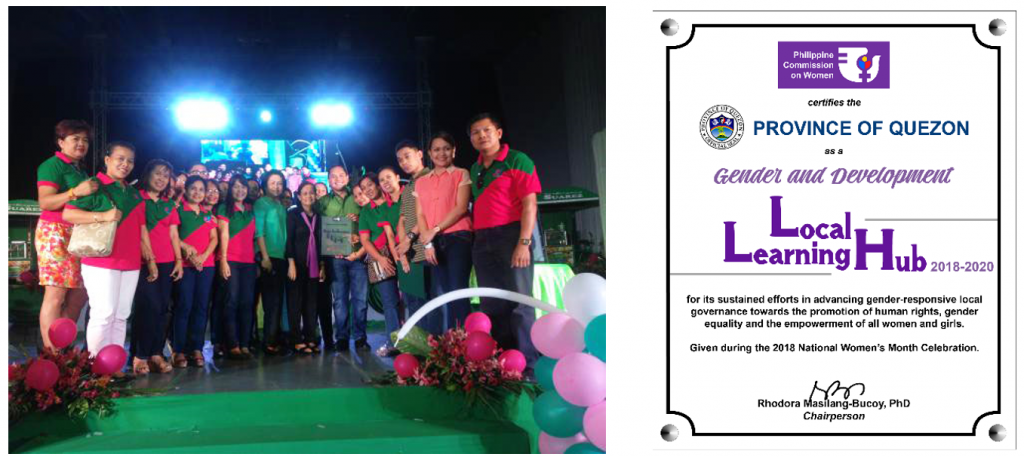
Quezon Province was among the five (5) pioneer LGUs recognized by the PCW for its notable GAD initiatives and programs. With this certification, Quezon Province remained driven in delivering multifaceted GAD services and gender-responsive health, and environmental programs.
Quezon Provincial GAD Office
The Quezon Provincial GAD Office (PGADO) was established with the enactment of Provincial Ordinance 2005-02 entitled “Ordinance Providing for GAD Code of Quezon, and for Other Purposes”. This local policy institutionalized the Office as one of the executive departments under the Office of the Governor. The PGADO supports the Provincial GAD Focal Point System (PGFPS) to intensify gender mainstreaming in the processes, systems and services of the LGU. The PGADO is a coordinative, regulatory, and monitoring body of the Province to focus on gender-responsive projects and activities and facilitates the implementation of Quezon Province GAD Code.
The office has 19 staff members (11 permanent and 8 casual staff) assigned to its two (2) divisions namely, Administrative and Finance and Operations and Management Divisions. The PGADO’s direct clients include the Provincial GFPS, City/Municipal GFPS, women and men’s groups, regional line agencies (RLAs), academic institutions, cooperatives, and non-government organizations (NGOs).
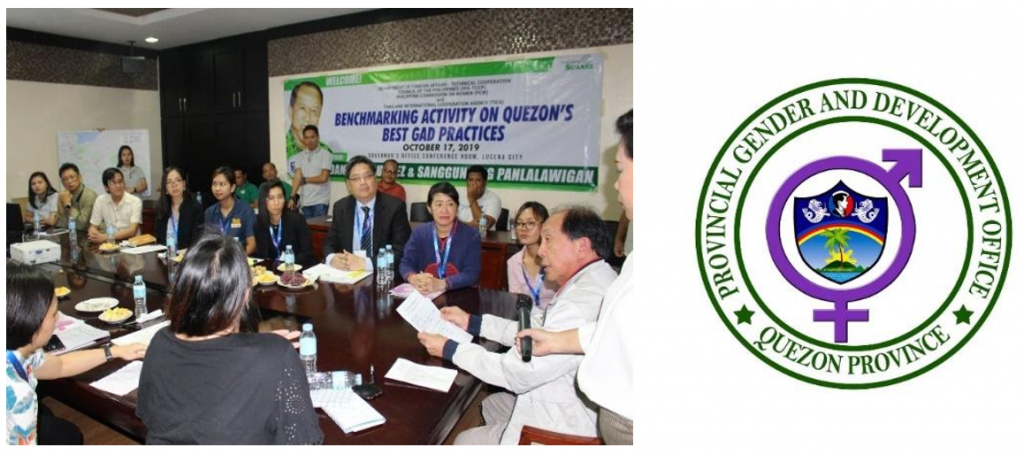
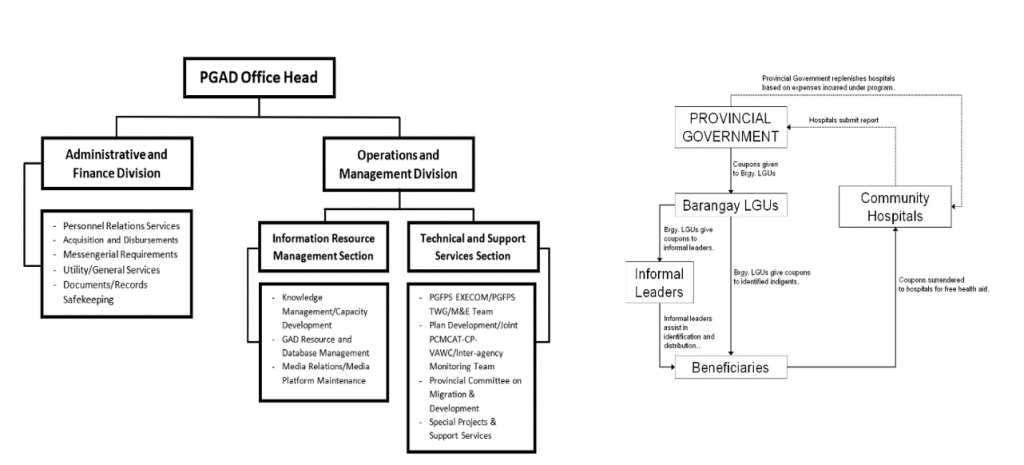
The establishment of the PGADO resulted in the increased participation rate of department heads on GAD-related initiatives in the Province. The clients of the Office confirmed the admirable efforts of the PGADO in providing technical assistance to LGUs. The staff of the Office conduct on-site visits to far-flung areas of the Province to provide GAD-related information and capacity development. The PGADO contributed in the Province’s transformed planning processes, with the integration of GAD perspective in the development of Provincial Social Welfare and Development, Health, and Disaster Risk Reduction Management Plans, among others. With these accomplishments, the PGADO has proven that institutionalizing a GAD Office or similar mechanisms can effectively advance gender mainstreaming, a strategy that is highly recommended for other LGU’s replication. The PGADO, therefore, contributes in attaining strategic goal on Transformed Social Norms and Culture Promote GEWE as it continuously integrates cultural transformation for gender equality in the services it provides.
Lingap Kalusugan para sa Barangay Program
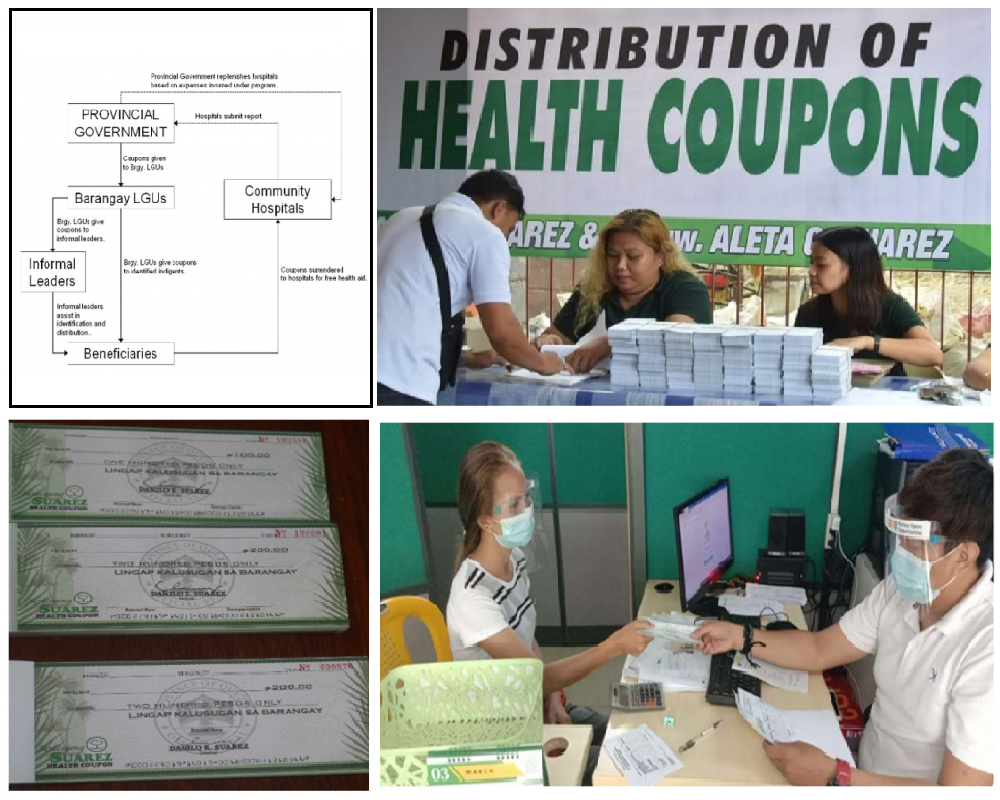
The Provincial Government of Quezon, through its Integrated Provincial Health Office (IPHO), reached out to the barangays to conceptualize the Lingap Kalusugan para sa Barangay (LKB) Program. The Program is reflective of the LGU’s priority to extend health care services to indigent families and those confined in the public hospitals of the Province. Mandated by the Provincial Ordinance No. 2012-15 entitled “Lingap Kalusugan sa Barangay Providing Mechanisms and Funding therefor and for other Purposes orgenerally known as the Health Coupon Ordinance, the Provincial Government allocates PHP 50,000.00 worth of coupons per barangay annually covering all the 1,242 barangays of the Province.
The LKB was designed to aid indigent people to fully or partially pay medical expenses through coupons in lieu of cash grants. The coupons may be used to purchase or avail hospital goods and services such as medicines; medical and surgical supplies, laboratory and radiology services, dialysis, and other hospital services. The health coupons are also used by women to access reproductive health services such as pap smear, ultrasound, among others. The health coupons have no expiration date, thus, beneficiaries who need medical attention can use the coupons anytime. One of the notable results of the Program is that the beneficiaries have realize the value of health. In addition, the beneficiaries worry less about paying hospital bills and prescribed medicines as they have coupons to partially cover medical expenses. Overall, the Program contributes not only in increasing the health-seeking behavior of its beneficiaries but also in easing the burden of women who are typically the care givers in households by lessening the time taking care of sick household members. With these, the Program contributes in the achievement of GEWE Plan’s strategic goal on Accelerated Human Capital Development given its mission to enable and increase the access of marginalized women and girls to health and reproductive services.
Quezon’s Sustainable Community-based Greening Program
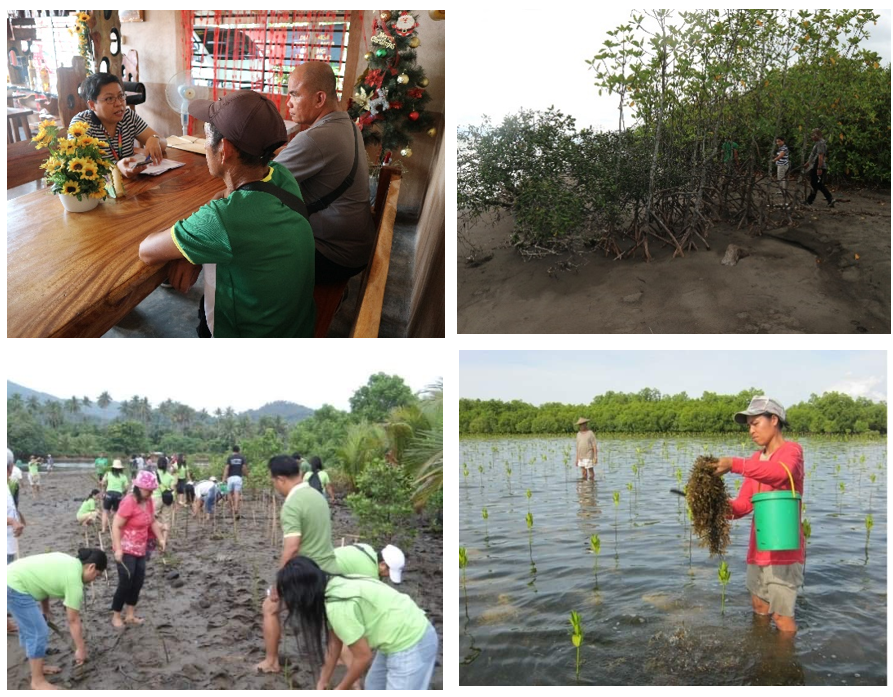
In 2012, the Provincial Government-Environment and Natural Resources Office (PG-ENRO) launched the Planting of two (2) Million Mangrove Trees in one (1) Day (referred to as 2-in-1 Program). This program addressees the vulnerabilities of coastal communities in the Province from the effects of destructive typhoons such as loss of lives and livelihood of people living in these areas. More than 39,000 residents from 196 barangays, 57 percent of whom are females, planted about 2.7 million mangroves along the coastlines of the Province. Being a multisectoral conservation and rehabilitation effort to protect mangrove forests, it eventually provided sustainable livelihood for the coastal communities of the Province as beneficiary families are given additional source income since the Program resulted to increased fish catch from 5 to 20 kilos. In addition, women have been provided with alternate source of income that can address their practical gender needs as they catch and sell fish, crabs, and snails from mangrove areas.
The Program also paved way to the organization of Luntiang Katipuneros (LKs) assigned to protect and monitor the mangrove planted areas. Among the observable impacts of the Program is on protection of the community from flashfloods and southwest monsoon or Habagat. Because of this, the people in the communities feel safe during natural calamities. The Program advocates for resiliency of poor and marginalized women to natural risks and disasters and promotes women’s participation and leadership in disaster risk reduction management as more women become involved in its implementation as LKs. Because of this, the Program contributes in achieving the GEWE Plan 2019-2025 Strategic Goal Area 4—Expanded Opportunities for Women’s Participation, Leadership and Benefit in Disaster Resilience and Humanitarian Action.
GAD LLH Coordinator:
Community Affairs Officer Carolina A. Lanceta
Email Address: pgadofficequezon@gmail.com
Phone: (042) 373-7175
GAD Local Learning Hubs:
Abra de Ilog (Likha Iraya)
Aklan (ACCW and MOVE-Aklan Chapter)
Baybay City (BMIS and WEE Program)
Davao City (IGDD, OSC-VAW, CMC, and Ray of Hope Village)
Iloilo (Convergence for Women’s Economic Empowerment Program)
Mabalacat City (Early Childhood Care and Development Program)
Misamis Occidental (PGADO)
Naga (Bantay Familia, GROW Negosyo Program, and Breast Feeding Program)
Palawan (LWC)
Pangasinan (PCIC)
Quezon City (QCPC and Social Hygiene and Sundown Clinics)
Quezon Province (PGADO, LKB Program, and 2-in-1 Program)

